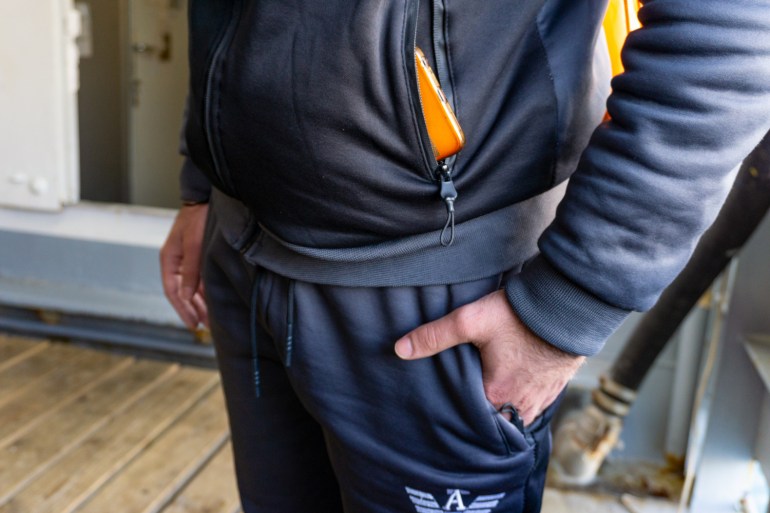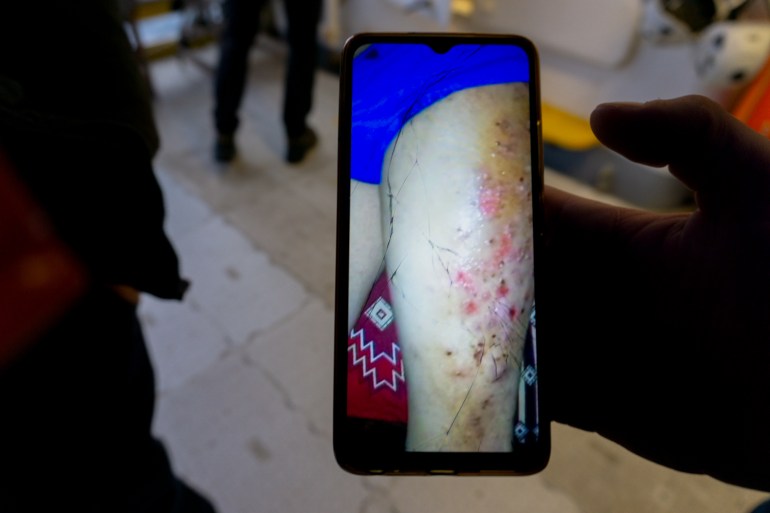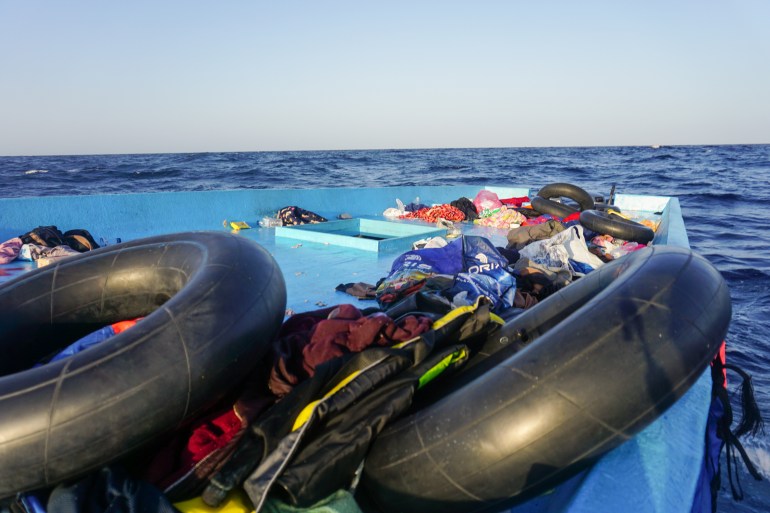[
Mediterranean Sea – Malik* is beaten, sold, and humiliated along the way, but after being rescued in the middle of the Mediterranean, he finds hope for a life beyond violence.
The 23-year-old Syrian from the city of Deraa traveled to Europe via Libya, where he became one of thousands of people detained and trafficked.
Each had their own reasons for risking the dangerous journey. For Malik, a recently graduated surgical nurse, it's a great way to save lives and aid humans in need, fulfilling his oath as a medical professional and serving in the military against President Bashar al-Assad's Syrian government. There was a choice between expectations. The country is still at war.
“If I had stayed, I would have been at war with another human being. And not just anyone – a person from my own country. If I had refused, I would have been considered a criminal,” Malik told Al Jazeera two days after being rescued at sea.
In January, Malik and 125 other refugees facing the dangerous passage across the central Mediterranean Sea were intercepted by the German search and rescue ship Humanity 1 at dawn after two days adrift in the cold sea.
Having left the port city of Sabratha on a rickety, sky-blue wooden boat, the survivors were exhausted and fearful of being sent back to Libya.
Malik stored himself to himself among the many survivors; Whereas the ship was crusing in direction of the Italian coast, he would usually sit quietly and stare on the waves. Leaning towards a darkish blue bench within the ship's clinic, along with his arms crossed, he defined that it was not solely the prospect of conscription that compelled him to go away Syria, but in addition that “there was nobody there to create There was no life, no cash.” No work”.
However his journey didn’t go in keeping with plan. Malik described the hardships that started when he arrived within the Libyan metropolis of Benghazi final Might, after investing his complete household's financial savings in an unbelievable quest for a greater life.
And one smuggler who promised to remain solely 10 days in Libya earlier than leaving by boat to Italy changed into spending greater than eight months shifting between detention facilities, smuggling bases and hangars – locations he in comparison with torture chambers. Was executed from.
“The primary place in Tobruk was a cattle farm, barely greater than that,” Malik stated slowly, selecting his phrases rigorously. “There was a horse inside and the opposite room was for us. The lads had lengthy hair and untrimmed beards; “They had been there for months.”
The 23-year-old man stated he was then bought by totally different militias and gangs and moved across the nation at the least 5 occasions.

trapped in a cycle of cruelty
4 months after coming into Libya, Malik tried to go away for the primary time. At midnight, 11 males armed with weapons set him aboard an overcrowded rubber boat, hoping the journey would mark the start of a brand new life.
However 100 meters (328 ft) from shore, the ship's weak construction started to provide method and, together with 70 different refugees, he was compelled to return to land.
On three different events, the younger Syrian tried to flee his captivity with the assistance of smugglers. However after every failed try, it was bought and shifted to a brand new location. Tobruk, Derna, Benghazi, Gazala; In every metropolis, they encountered a whole bunch of others dwelling in disease-ridden warehouses beneath the violent management of armed guards.
In accordance with Malik, beatings and humiliating telephone searches have grow to be an on a regular basis exercise. These caught whereas nonetheless in touch with the skin world had been violently attacked with stones or weapons till they turned unconscious.
They reported that whereas Malik was attempting to flee alone, he fell into the arms of a robust man within the capital, Tripoli – which is especially well-known for commerce with Syrians.
“He stated we owed him $1,000 and we would have liked to repay our debt. “I stayed there for 17 days, working from 4 within the morning till I handed out at night time,” Malik stated, doing building work, cleansing homes or working within the fields. Refusal was not an choice.
Malik shook his head in disbelief as he spoke, “One of many younger males I labored with was insisting on going to the toilet, however he was being informed no.” “Our man in cost instantly shot him within the leg as punishment. “I’ve seen extra blood in Libya than wherever else.”
In accordance with Amnesty Worldwide, many refugees and migrants fleeing Libya are repeatedly subjected to exploitation and compelled labor by armed teams. Trapped in a vicious cycle, many individuals rely on their kinfolk at residence to switch cash for his or her launch.
Nevertheless, it’s not possible to attempt to estimate the precise variety of folks exploited or detained within the nation.
“We hear the identical tales time and again from survivors, impartial of one another,” Petra Kryschok of the German NGO SOS Humanity informed Al Jazeera.
“Individuals are randomly detained in 'prisons' and compelled to pay to get out, usually with cash they don't personal. Or are exploited for unpaid work,” she stated.

Whereas Libyan authorities declare to be cracking down on the vicious business, the nation's Prime Minister Abdul Hamid Dbeibah has appealed for extra help from the worldwide neighborhood to deal with the difficulty.
Throughout a latest go to to Italy, Dbeibah stated Libya “is at battle towards smugglers” and that the war-torn nation “invitations everybody on the European facet to cooperate and assist us”.
Libyan officers didn’t reply to Al Jazeera's request for remark.
'Insult, violence and torture'
Sitting quietly subsequent to Malik, Jamal*, a 28-year-old from Damascus, nodded. The soft-spoken father of two has tried to cross the world's most harmful migration route in a picket boat on three separate events. Twice, he says he was pulled again by the Libyan coast guard, which he describes as hell on earth.
Since 2015, the EU has supplied monetary assist to the Libyan coast guard as a part of its plan to scale back migration from North Africa. The Italian authorities, at the moment led by Giorgia Meloni of the far-right get together Fratelli d'Italia (Brothers of Italy), has since gifted a number of ships to the coast guard – a vessel topic to common scrutiny of abuses, extortion and crimes towards humanity. Ignoring the allegations.
In February, it was reported by German outlet Spiegel that Frontex, the European border and coast guard company, has shared the placement of distressed boats with the Libyan coast guard greater than 2,000 occasions over the previous three years – a cooperation which will have facilitated refugees. and the return of migrants to brutal detention camps.
“They (Libyan coast guard) ensured that our engines had been separated from the boat and submerged in water. “They even took what little meals we had left earlier than setting fireplace to the fishing boat in the midst of the ocean,” Jamal informed Al Jazeera about his second try to go away Libya.
Overwhelmed by coast guards, robbed of the cash he had left and introduced again to shore, Jamal had no concept the place his destiny would take him. He reported that, together with 70 others, he was being held in a detention middle in Bir al-Ghanem, southwest of the capital – infamous amongst Syrians.
“Everyone seems to be afraid of this place. It’s identified for humiliation, violence and torture – and as soon as detained it’s not possible to go away.
A few of Jamal's phrases had been little greater than a whisper; Regardless of two days' relaxation on the rescue ship, he was nonetheless drained after the troublesome journey at sea.
He recalled the Derna hangar, which was roughly 50 by 15 meters (164 by 49 ft), the place he stated he was greeted with one other humiliating beating. 4 hundred different refugees and migrants had been crammed inside filthy hangars run by Libyan migration authorities. Most of them had been from Egypt, Bangladesh, Pakistan and Syria.
“The humiliation by no means ended; They used to beat us with inexperienced water hoses or picket sticks. Some had been there for a 12 months and a half,” he stated, working his fingers by his unshaven black beard.

'I’m slowly dying attributable to starvation'
Lots of the males within the hangar had been affected by extreme scabies infections, a contagious pores and skin illness that thrives within the scorching, cramped atmosphere. Each 22 hours, they’d obtain small parts of pasta and water to outlive till the subsequent day.
Jamal's voice began trembling as he remembered a selected incident. He blinked quickly and appeared away.
“There was a riot inside us, it began over one thing silly. An aged Syrian man slapped one of many guards, and he was dragged out into the yard the place they beat him till he was unconscious. He misplaced his eye, it was only a purple wound within the socket the place the attention was once.”
Understanding the chaotic circumstances they had been dwelling in, Jamal knew he needed to depart. However his captors demanded cost of $4,000 per individual earlier than releasing anybody – cash Jamal didn’t have.
“We had been dying slowly due to starvation and beatings. So, we began rioting. Day by day, we attacked the guards they usually punished us by closing the hangar in full darkness and beating us constantly.
After 15 days of steady rioting, Jamal managed to borrow cash from a relative and made a deal to pay $3,000 to be launched.
Regardless of the approaching threat of recapture or drowning, he was keen to gamble on his life to succeed in security in Europe.

He stated, “It’s higher to die at sea than return to Libya.”
Jamal and Malik are amongst greater than 4,400 folks anticipated to flee to Europe by way of the Mediterranean route in 2024 – a pointy improve in comparison with the identical interval final 12 months.
In accordance with Frontex, in 2023, at the least 380,000 folks made the arduous journey to the Mediterranean, the very best degree of arrivals since 2016. 100,000 of them got here from Syria.
“Fleeing Damascus to start out a life in Europe was hell in itself. However attempting to flee Libya proved even worse,” he stated, opening his arms in resignation.
With solely a passport and hope for a good life in Europe, Jamal stated his journey is way from over. He nonetheless bears the duty of taking good care of six folks again residence: his two kids, his spouse, his dad and mom, and his youthful sister.
An important factor is to get them behind them to security, he concluded his story.
“This ache is not only mine, I share it with each Syrian. And each man who got here by Libya. Everybody there may be struggling silently.”
Aside from him, Malik raised his voice in settlement. He believes that the recollections of what he has seen within the final eight months won’t ever fade.
When requested what he hoped to realize from life in Europe, he shrugged his shoulders and stated, smiling: “We simply wish to dwell, that's all.”
*Names have been modified to guard the identities of the interviewees and their households.

